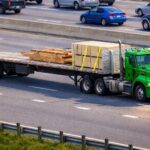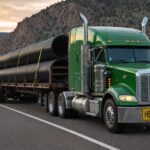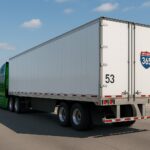If you’re in the business of moving big things—we’re talking about bulldozers, industrial tanks, or even wind turbine blades—you need more than just a truck and trailer. You need heavy haul trucking. It’s a specialized form of transportation built for the largest, heaviest, and most difficult-to-move loads.
In this guide, we will explain heavy haul trucking. We will discuss what makes a shipment “heavy haul.” We will also cover permits and safety.
You will learn about the equipment you need. We will highlight why the Bigger Buba 3 Axle Trailer is a great choice. Finally, we will help you choose the right heavy haul trucking services for your job.
What Is Heavy Haul Trucking?
Heavy haul trucking involves transporting loads that are heavier, wider, taller, or longer than standard legal limits. These are called oversize or overweight shipments, and they require special trailers, permits, routing, and handling.
Common examples of heavy haul shipments:
- Cranes or bulldozers
- Prefab homes
- Construction equipment
- Steel or concrete beams
- Large tanks or wind turbine parts
Each state has its own rules about what counts as a heavy haul, but generally, these limits apply:
- Width: Over 8 feet 6 inches
- Height: Over 13 feet 6 inches
- Length: Over 53 feet
- Weight: Over 80,000 lbs gross vehicle weight (truck + trailer + cargo)
If your cargo exceeds any of those, you’re dealing with heavy haul—and that means planning ahead.
Why Heavy Haul Trucking Is Different
Unlike standard freight shipping, heavy haul trucking services require a deeper level of expertise. You can’t just throw something huge on a trailer and hit the road.
First of all you need to:
- Apply for permits (sometimes in multiple states)
- Plan your route to avoid low bridges or weight-restricted roads
- Coordinate with safety escorts and sometimes local police
- Use specialized trailers that support unusual shapes and weights
- Follow strict safety and loading procedures
This extra work keeps everyone safe and protects your cargo.
Safety Services and Legal Requirements
Moving oversized freight isn’t just about brawn—it’s about brains and safety services too. Most heavy haul shipments require the following safety steps:
1. Permits
You need oversize or overweight permits from every state you travel through. Some cities and counties have their own rules, too.
2. Route Surveys
Before transport, someone must check the route for bridges, sharp turns, low-hanging power lines, or road construction. GPS won’t cut it for a 110,000-pound load.
3. Pilot/Escort Vehicles
Many states require front and/or rear escort vehicles to warn other drivers. These vehicles also help the truck navigate tight turns and lane changes.
4. Signs, Flags, and Lights
The truck and trailer must display “Oversize Load” banners, red or orange warning flags, and sometimes flashing lights.
5. Certified Drivers
Operating heavy haul equipment takes skill and training. Most carriers only use experienced drivers with specialized licenses.
Following these rules doesn’t just keep you legal—it prevents injuries and damage.
The Right Equipment for the Job
Choosing the right trailer is one of the most important decisions in heavy haul trucking. Your trailer must support the load safely, distribute the weight properly, and stay within height and axle regulations.
Let’s explore the most commonly used trailer types.
1. Lowboy Trailers
These sit low to the ground and allow tall machinery to ride legally under bridge heights.
- Deck height: ~18 to 24 inches
- Best for: Construction equipment, excavators, backhoes
2. Step Deck Trailers (Drop Deck)
These trailers have two deck levels and are good for moderately tall loads.
- Deck height: ~42 inches (lower deck)
- Best for: Tractors, skid steers, building materials
3. Multi-Axle Trailers
Add extra axles to distribute weight more evenly. The more axles, the heavier the cargo you can haul legally.
Why The Bigger Buba 3 Axle Trailer
At INTERSTATE 365, the Bigger Buba 3 Axle Trailer is a top choice for clients who need to move large and heavy cargo without jumping through permit hoops every time.
Why it stands out:
- More load capacity without needing specialized trailers
- Great balance of strength and maneuverability
- Built to handle heavy loads while staying road legal in more states
- Ideal for construction equipment, steel loads, and industrial gear
If you’re hauling heavy equipment or construction materials, this trailer handles the stress while giving you flexibility and reliability.
Real-World Scenarios: When Heavy Haul Trucking Makes Sense
Scenario 1: Moving a Bulldozer Across States
A client needs to ship a 95,000-lb bulldozer from Texas to Colorado. The load exceeds legal height and weight limits, making it impossible to use a standard trailer. The solution?
A low pro trailer with the right axle spacing, heavy-duty tie-downs, and all necessary permits arranged in advance. In addition, the route was carefully surveyed to avoid low bridges, weight-restricted roads, and sharp turns.
Experienced drivers familiar with heavy machinery transport managed the journey, ensuring a safe and smooth delivery across multiple states.
Scenario 2: Delivering Industrial Tanks
Oversized water tanks need to move from a manufacturer in Ohio to a refinery in Louisiana. These tanks are not only bulky but extremely sensitive to tilting or sudden movements. A Bigger Buba 3 Axle Trailer was selected because of its superior load distribution and enhanced stability.
To prevent damage, professional crews used specialized tie-down equipment and supported the tanks with cradle structures.
Escort vehicles went with the shipment. Drivers and escort teams communicated in real-time. This ensured that every turn, bridge crossing, and road condition was managed carefully.
Scenario 3: Construction Site Relocation
A large construction site needed to move multiple cranes, concrete mixers, and steel beams to a new project 300 miles away. Timing was critical to avoid delaying the new project’s launch. By using a combination of step deck trailers, multi-axle flatbeds, and carefully timed loading schedules, the project stayed on track.
Experienced drivers secured each load according to DOT rules. This saved time, money, and stress for everyone involved.
Common Industries That Rely on Heavy Haul Trucking
Heavy haul isn’t just for construction. It supports several industries, including:
- Oil and gas: Moving rigs, pipes, and storage tanks
- Mining: Transporting crushers and off-road haulers
- Manufacturing: Delivering massive machinery or factory components
- Power and utilities: Hauling transformers and generators
- Agriculture: Shipping large combines and tractors
Each of these industries counts on specialized trucking service providers who understand the rules and equipment required to keep freight moving safely.
Tips for a Successful Heavy Haul Shipment
Whether you’re shipping heavy freight once a year or every week, follow these tips to avoid problems:
1. Start Early
Permits and routing can take days to approve. Don’t wait until the last minute.
2. Work With Experienced Carriers
Not all freight companies offer heavy haul trucking services. Look for ones with a proven track record.
3. Communicate Clearly
Give your trucking company accurate dimensions, weight, and pickup/drop-off details. Surprises cause delays.
4. Ask About Insurance
Heavy loads mean higher risks. Make sure your shipment is covered.
5. Use the Right Trailer
The right trailer, like the Bigger Buba 3 Axle, can make or break a shipment. Choose equipment designed for the job.
Why Choose Interstate365 for Heavy Haul Trucking Equipment?
At INTERSTATE 365, we know oversized freight. Whether you need to move a massive tank, a crane, or multiple pieces of heavy equipment, we have the trailers, the team, and the experience to get it done.
Our lineup includes:
- Bigger Buba and other 3 Axle Trailers
- Step deck and flatbed trailers
- Low profile trailers for tall or heavy machines
- Custom-made trailers for unique challenges
Final Thoughts: Heavy Haul Done Right
Heavy haul trucking isn’t easy, but with the right partner and the right equipment, it doesn’t have to be stressful. When you’re moving heavy haul shipments, you need:
- A smart plan
- A skilled team
- The right trailer for the job
Don’t leave your oversized freight to chance. Choose a company that offers full trucking service, understands regulations, and uses trusted gear like the Bigger Buba 3 Axle Trailer.
Need help with your next heavy haul? Contact us today and let’s get your freight moving safely, legally, and on time.




